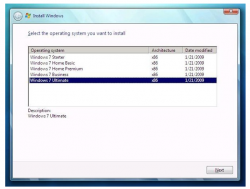Got a tip for us?
Let us know
Become a MacRumors Supporter for $50/year with no ads, ability to filter front page stories, and private forums.
Win 7 - Multiple Versions?
- Thread starter Freis968
- Start date
- Sort by reaction score
You are using an out of date browser. It may not display this or other websites correctly.
You should upgrade or use an alternative browser.
You should upgrade or use an alternative browser.
Uh... Vista Starter, anyone?
Windows Vista:
Starter, Home Basic, Home Premium, Business, Enterprise, Ultimate.
In 32-bit and 64-bit versions.
Also Windows Vista Business Embedded and Windows Vista Ultimate Embedded.
Windows 7 is BETTER than current.
Windows Vista:
Starter, Home Basic, Home Premium, Business, Enterprise, Ultimate.
In 32-bit and 64-bit versions.
Also Windows Vista Business Embedded and Windows Vista Ultimate Embedded.
Windows 7 is BETTER than current.
Just wondering, how do you actually get that option page? 
Sure I read something about the versions... can't remember where though....
Sure I read something about the versions... can't remember where though....
Why don't they just get back to doing Home and Pro? Now they have one called Starter? LOL! Talk about confusing the hell out of people.
XP also has XP Starter Edition.
Here's the thing about XP Starter Edition, it's only available in 3rd world countries. It's cheap, but it is also VERY restrictive. You can't really even get a key in the US, without really trying.
Also, XP has also had more than 2 versions. You have the following:
XP Starter, XP Home, XP Media Center Edition (with multiple versions or MCE, like 2003, 2004, 2005), and XP Professional. There's also various versions of XP Embedded as well.
For Embedded versions, you have XP for Embedded Systems, and XP Embedded. The first one can only boot into an application, and can't really be used as a full OS. For XP Embedded, it's a full OS. MS is now also coming out with XP Embedded Standard 2009, which just has added updates (IE7, .Net 3.5, ect). There's also a version for Point of Service devices, and heck, you might as well consider Window Fundamentals for Legacy PCs.
There's also a Windows XP Tablet PC Edition.
There's also 2 versions of Windows XP that are 64-bit. You have Windows XP 64-bit Edition and Windows XP Professional x64 Edition. The first one is only for Itanium processors and the Second one is for any x32 64-bit processor. However, the Kernel in XP Pro 64-bit is NOT the same one from Windows XP 32-bit. It's the same kernel that Windows Server 2003 x64-bit uses. In fact, XP's version number is 5.1 and Windows XP Pro x64/Windows Server 2003 is 5.2 As you all know, there are 3 service packs for XP, but there's only 2 for Windows Server 2003/XP x64.
People say Vista "complicated" things for the end user (only if you're an idiot though). If anything, it made things simplier.
Vista Home Basic is what XP Home is. Vista Home Premium is what XP Media Center is. XP Tablet edition is gone. That functionality is now added into Home Premium and above. There is likely only to be 1 version of Vista Embedded, unlike XP (which you have to consider had been on the market as the main OS of MS for 6 years). While there is still 64-bit versions of Vista, they now use the same key and the same kernel, which simplifies updating for MS and simplifies things for the end user (plus, they can go to 64-bit anytime they want to).
Hopefully it will be on install disk,and users can pick what they want.
I see a need for different installs, netbooks are a very different beast then a Mac Pro running Windows 7, but buying so many different installs is just annoying. And if I own the top install, I doubt I'd need all these features on my netbook
I see a need for different installs, netbooks are a very different beast then a Mac Pro running Windows 7, but buying so many different installs is just annoying. And if I own the top install, I doubt I'd need all these features on my netbook
It is one of the things that made me smile during a stevenote when he quipped about mac coming in many versions .... all the same for one price 
I was one of the suckers who shelled out for Ultimate and its been one of the many letdowns
I'm a mac now .... pc can go whistle
I was one of the suckers who shelled out for Ultimate and its been one of the many letdowns
I'm a mac now .... pc can go whistle
When you install Windows you can de-select the "activate after install automatically" button and that brings you to the referenced screen. It's been that way since XP.
When you install Windows you can de-select the "activate after install automatically" button and that brings you to the referenced screen. It's been that way since XP.
While you can deselect the automated activation on first run, for XP, each CD does not contain every version of XP. An XP Home CD can ONLY install XP Home, XP Pro can only install XP Pro, XP Starter Edition can only install XP Starter Edition.
Register on MacRumors! This sidebar will go away, and you'll see fewer ads.


